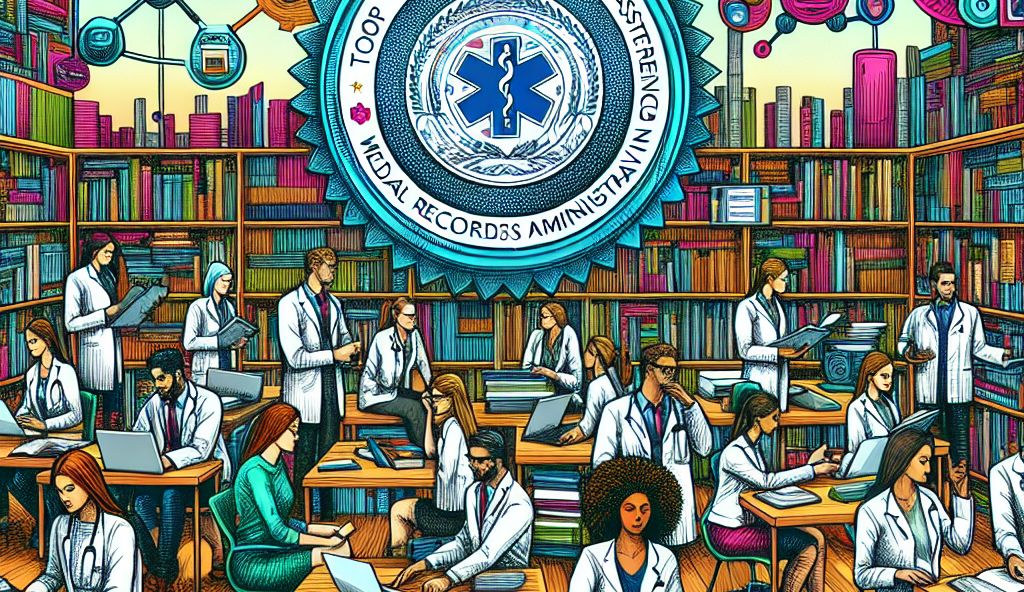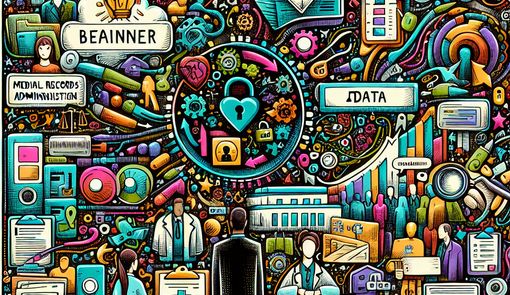Top Certifications for aspiring Medical Records Administrators

The field of Medical Records Administration is a critical component of healthcare management, overseeing the maintenance and protection of patients' health information. In an era where electronic health records (EHRs) are standard practice, the demand for skilled professionals in this area is on the rise. Certifications in this field not only validate a professional's expertise but also provide a competitive edge in the job market. In this article, we will explore the top certifications for aspiring Medical Records Administrators and provide guidance on how to attain these credentials.
Certified Professional in Health Information Management (CPHIM)
The CPHIM is a prestigious certification offered by the American Health Information Management Association (AHIMA). This certification demonstrates a profound understanding of health information management (HIM), including medical terms, coding, and legal aspects of health records. To qualify for the CPHIM, candidates must have a bachelor's degree from an accredited institution and at least two years of experience in HIM. The process involves passing a rigorous examination that covers topics such as data management, information governance, and informatics.
Registered Health Information Administrator (RHIA)
Another important certification from AHIMA is the RHIA. Professionals who hold the RHIA certification are recognized as experts in managing patient health information and medical records. They are adept at administering computer information systems, collecting and analyzing patient data, and ensuring the privacy and security of patient records. Eligibility for the RHIA requires a bachelor's or master's degree from a CAHIIM-accredited HIM program and passing the RHIA certification exam.
Certified Health Data Analyst (CHDA)
For those who aim to specialize in data analysis within the medical records field, the CHDA certification is a valuable asset. AHIMA also offers the CHDA credential, which emphasizes the importance of collecting, interpreting, and using healthcare data effectively. Candidates must pass an exam focused on data management, data analytics, and the use of data in decision-making processes. While there are no specific educational requirements, AHIMA recommends that applicants have experience in healthcare data management or analysis.
Certified Electronic Health Records Specialist (CEHRS)
Offered by the National Healthcareer Association (NHA), the CEHRS certification is tailored for individuals focused on the electronic side of health records management. To earn the CEHRS, candidates must pass an exam that tests their knowledge of EHR systems, including implementation, maintenance, and privacy and security regulations. Although there are no set prerequisites, candidates often have experience working with EHR systems or have completed an educational program that includes EHR coursework.
Certified Medical Records Auditor (CMRA)
For professionals interested in overseeing the accuracy and integrity of medical records, the CMRA certification is ideal. This certification, issued by the Practice Management Institute (PMI), validates a Medical Records Administrator's skills in auditing, coding, and compliance with healthcare regulations. To become a CMRA, a candidate must have experience in medical records management and pass an exam that covers auditing techniques, compliance issues, and coding guidelines.
How to Get These Certifications
Obtaining a certification in Medical Records Administration usually involves a combination of education, experience, and successful completion of an examination. To prepare, candidates should:
- Research each certification's specific requirements, which may include educational prerequisites, minimum experience, and any mandatory coursework.
- Enroll in study programs or courses that provide the necessary knowledge and skills. Many of these programs are offered online, making them accessible to working professionals.
- Gain practical experience in the field of medical records, whether through internships, job roles, or volunteer positions. This experience is invaluable when it comes to understanding the real-world applications of theoretical knowledge.
- Finally, register for the certification exam, dedicating adequate time to study and review. Utilize resources such as study guides, practice exams, and professional networks to enhance your preparation.
Conclusion
In conclusion, earning a certification in Medical Records Administration can significantly boost one's career prospects. The certifications we've discussed—CPHIM, RHIA, CHDA, CEHRS, and CMRA—are among the top credentials that highlight expertise in this essential healthcare sector. By following the steps outlined to obtain these certifications, aspiring Medical Records Administrators can distinguish themselves as highly skilled and sought-after professionals in the evolving world of healthcare information management.
Frequently Asked Questions
Frequently Asked Questions
1. Why are certifications important for Medical Records Administrators?
Certifications are crucial for Medical Records Administrators as they validate the professional's expertise and demonstrate a commitment to ongoing learning and development in the field. Employers often prefer candidates with certifications as they ensure a certain level of competency and knowledge. Additionally, certifications provide a competitive edge in the job market and can lead to better career opportunities and higher salaries.
2. How do I choose the right certification for my career goals?
When selecting a certification, consider your career goals, interests, and the specific skills you want to develop. Research the requirements of each certification, such as educational prerequisites, experience requirements, and exam details, to determine which aligns best with your aspirations. You may also seek guidance from industry professionals or mentors to gain insights into the relevance of different certifications in the job market.
3. Do I need prior experience in medical records to pursue these certifications?
While some certifications may have experience requirements, others may not. It is advisable to check the eligibility criteria for each certification to understand if prior experience is necessary. Even if experience is not mandatory, having a background in medical records or related fields can be beneficial in preparing for the certification exams and enhancing your understanding of the concepts covered.
4. How can certification programs help me advance in my career?
Certification programs provide structured learning opportunities that cover essential topics and best practices in medical records administration. By completing a certification program, you gain a comprehensive understanding of industry standards, regulations, and technologies relevant to the field. This knowledge not only enhances your professional credibility but also equips you with the skills needed to tackle complex challenges and take on leadership roles within healthcare organizations.
5. Are online certification programs equally valuable as traditional classroom-based programs?
Online certification programs offer flexibility and convenience for working professionals who may not have the time to attend traditional classroom-based programs. These programs are designed to provide the same level of knowledge and skill development as their on-site counterparts. However, it is essential to ensure that the online program is accredited and recognized by relevant industry bodies to ensure the quality and validity of the certification.
6. How long does it take to prepare for and pass a certification exam?
The preparation time for a certification exam can vary depending on the individual's existing knowledge, study habits, and the complexity of the exam content. On average, candidates may dedicate several weeks to a few months to prepare adequately for a certification exam. Factors such as self-study consistency, access to study materials, and practical experience in the field can also influence the preparation timeline.
7. What are the benefits of joining professional networks or associations related to medical records?
Engaging with professional networks or associations in the medical records field can offer numerous benefits, including access to industry updates, job opportunities, and networking events. By connecting with peers and experts in the field, you can stay informed about emerging trends, best practices, and career development opportunities. Professional networks also provide a platform for knowledge sharing, mentorship, and continued learning to further enhance your expertise in medical records administration.
8. Is recertification required for these certifications, and how often?
Recertification requirements vary for each certification and are determined by the certifying body. Many certifications in the healthcare sector require professionals to renew their credentials periodically to demonstrate ongoing competence and commitment to professional development. Recertification often involves completing continuing education credits, participating in professional development activities, or retaking the certification exam at designated intervals. It is essential to stay informed about recertification requirements to maintain the validity of your certifications and uphold your professional standing in the field.
Further Resources
For additional information and resources on certifications for Medical Records Administrators, the following external links can be valuable:
- American Health Information Management Association (AHIMA) - AHIMA is a leading organization in the field of health information management, offering a range of certifications including CPHIM, RHIA, and CHDA.
- National Healthcareer Association (NHA) - NHA provides certifications like CEHRS for healthcare professionals, including those specializing in electronic health records.
- Practice Management Institute (PMI) - PMI offers the CMRA certification for individuals looking to enhance their skills in medical records auditing and compliance.
- Commission on Accreditation for Health Informatics and Information Management Education (CAHIIM) - CAHIIM accredits health information programs, ensuring quality education and eligibility for certifications like RHIA.
- Healthcare Information and Management Systems Society (HIMSS) - HIMSS is a global organization focused on improving healthcare through information and technology, providing insights and resources for professionals in the field.
- American Academy of Professional Coders (AAPC) - AAPC offers certifications in medical coding and auditing, complementing skills required for roles like CMRA.
These resources can serve as valuable guides for individuals pursuing a career in Medical Records Administration and seeking to enhance their knowledge and credentials in the field.






